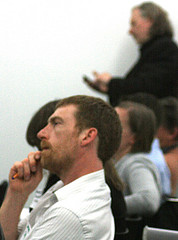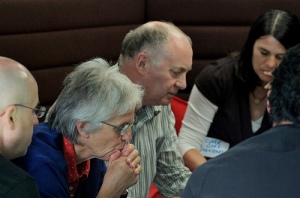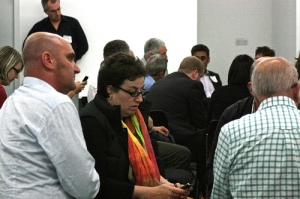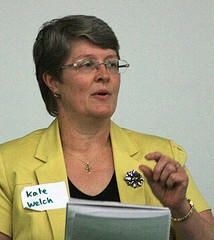Big Society In The North held a first meeting in Sheffield on 27th July 2010 to discuss what Big Society might (or might not) be in the North. John Popham and Julian Dobson organised it. Electric Works kindly let us use their space for free (and a very nice space it is too).
A number of people stood up and told us what they thought ‘Big Society’ means or what it does not mean, and how it might apply in the North of England context. They told us about the projects that they have done, currently do or want to do. Then we broke up into groups to discuss topics. I joined the ‘a-bit-sceptical-but-willing-to-discuss’ group which was so large that, by mutual agreement, it was split into two.
The discussion was lively. The Big Society In The North blogs will provide more detail on that and links to recordings of some of it.
I went to the meeting partly because initial discussions by others elsewhere had suggested that Big Society might include expecting communities to run institutions such as museums, libraries and schools on a voluntary basis. These ideas were being floated at the same time as announcements were being made about cuts to culture and education budgets.
Big Society is not supposed to be about money, but one of the first things that the Government did was to announce the Big Society Bank. It will take money from the bank accounts we have lost or forgotten and make it available to us to help us do voluntary work.
Big Society is not supposed to replace public services. One of the first proposals backed officially is recruiting more volunteers so that museum opening hours can be extended. Another proposes “neighbourhood media and cultural activities in poorer areas.” It does not take a huge leap of imagination to see how this might undermine arguments against cutting budgets for cultural provision by local and national public organisations (I shall argue another time why that might not be a good idea).
Big Society is supposed to be about people taking responsibility for their neighbourhoods, it seems. “Empowering” is one word used quite a lot; “grassroots” was a word used quite a lot at the Big Soceity In The North meeting in Sheffield.
I remain rather puzzled about how others define ‘Big Society.’ I want to be positive about it. I think that it might be about some things that we have been doing in the North for a couple of hundred years at least.
The Government talks about enabling people to sidestep the bureaucracy to do things to help their community. Do they mean that people should ignore the advice and recommendations of professionals?
Someone commented recently that the idea of Big Society providing “extra hands” to help museum professionals do their work was preferable to the idea of volunteers running museums. Of course, there are many museums that would not exist without ‘volunteers’ setting them up, raising funds and running them. There are also many professionals who can and do volunteer whose professional skills and knowledge are extremely helpful.
In Sheffield, the issue of which people might lead and do things in the Big Society was a subject of lively discussion.
Sometimes the people who express things most loudly and put themselves forward to lead things in a neighbourhood are not the best people for such roles. Sometimes they are simply the people who shout loudest, and listen least.
In some areas, many members of the community struggle to believe that they are capable of anything, even of exercising their democratic rights. During the run-up to the general and local government elections in spring 2010, I heard many people say that they were not intending to vote because they felt that they had no ability to influence anything at local level, let alone change it.
On the train home, I was fortunate enough to travel back with Kate Welch of Acumen (do visit the website to find out more about their work), who had been one of the speakers at the Big Society In The North. She was one of the people who had impressed me. Her positive attitude, combined with her clear view of gritty reality and her achievements to date in making a difference in communities, were inspiring. What Kate has done and intends to do made me think a lot.
Since that meeting in Sheffield, I have read what others have written about the discussions that evening, and of what actions people are taking. I am still thinking about the issues, how the Big Society idea fits into the northern context. The conclusions to which I have come thus far are:
1) ‘Big Society’ is a meaningless term in itself – it can mean all things to all men, and can mean nothing to anyone;
2) the politicians, policy-makers and strategists have deliberately chosen a term that means nothing definitive in itself;
3) it is very clever to get us all involved in a big discussion about what our society is, what its values are, how it should or should not function.
I continue to observe, listen and to think about the Big Society whilst doing the things that I have always done to help others.
PostScript
Lauren Currie’s post about ScotGovCamp (held a few days after the first Big Society In The North meeting) on her Redjotter blog includes a video about the session she convened about Big Society. Note: one of the first questions asked was what happened in the Big Society In The North meeting.
Big Society, Odd ‘ol me and the Lash by Steven Tuck explores an idea about Big Society. It reminds me of a lady I met who regards it as a personal duty to keep the country roads around her free from litter. She keeps old carrier bags in her car and stops to dash out and remove any rubbish en route to the shops or railway station. I doubt most of it would get picked up otherwise.




